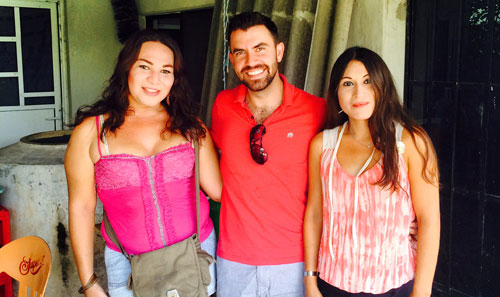Posted by Ben Clapham, September 3, 2014

amfAR’s Ben Clapham (center) with CDIJ’s Amaranta (left) and Amaya (right).
I first visited Centro de Desarrollo e Investigación sobre Juventud, A.C. (CDIJ) in Campeche, Mexico, in mid-2012, shortly after the organization’s founding. At the time, CDIJ consisted of a dedicated team of just three people, all under 30, who worked on a volunteer basis out of the director’s house. The grant they received from amfAR that year to support their work among Mayan GMT was their first ever outside funding, and I came to help the young organization develop strategies to increase their visibility. They were the essence of a grassroots GMT organization, and it was truly motivating to see this youth-led organization attempt to do so much with so few resources.
Due to this dedication and the effectiveness of their early efforts, CDIJ now receives funding not only from amfAR, but also from other international donors, including the Global Fund. More importantly, they are the first GMT organization in Mexico to sign a Memorandum of Understanding with the Ministry of Health. It states that the government will support and fund their work to improve GMT’s access to health services.
During a visit last week, I found myself seeing a whole new CDIJ. Upon my arrival, I was greeted at CDIJ’s new office space by a team that has more than tripled in size and that consists of a mix of paid and unpaid staff. They now have an office that looks like a gorgeous Mexican hacienda, complete with a sun-drenched terrace. When I first met the executive director, Antonio Maldonado, he was a little unsure about his new role, but he clearly possessed the motivation and desire for his work. Two years later it is as if I am meeting someone completely different. Antonio had every detail planned for my visit and he was leading his staff with confidence. “Antonio is a model for me. He has shown me that I am worth something and that I can and must help trans here in Campeche,” said Amaranta, CDIJ’s first trans staff member.
Generally, organizations focus on one population or the other, and CDIJ is one of few GMT organizations in the world that works closely with men who have sex with men and also has a strong trans-led program. The team has also established several other exciting programs. They provide HIV testing and counseling, host a support group for trans indigenous women, provide peer education and outreach to the community, and train healthcare workers at government-run facilities about how to address LGBT health needs.
I was so impressed by CDIJ’s growth in two short years. They truly represent what the GMT Initiative is all about—funding small, grassroots GMT organizations to increase their capacity so they can receive bigger grants from other international and local donors. I left Campeche feeling extremely proud to work at amfAR and be a part of a foundation where I get to experience these small but ever-so-important victories.